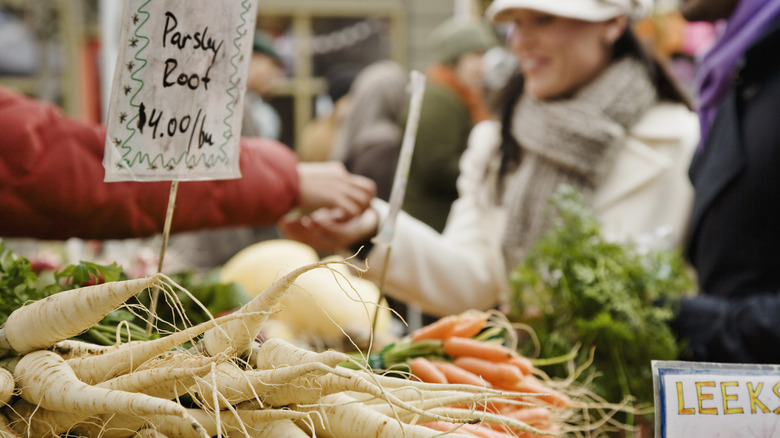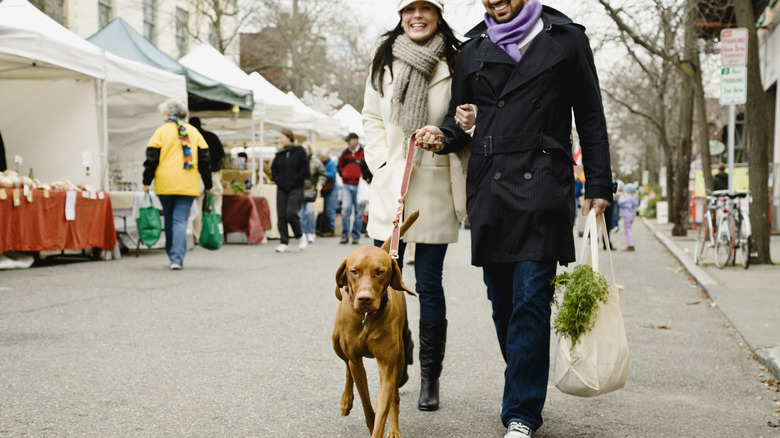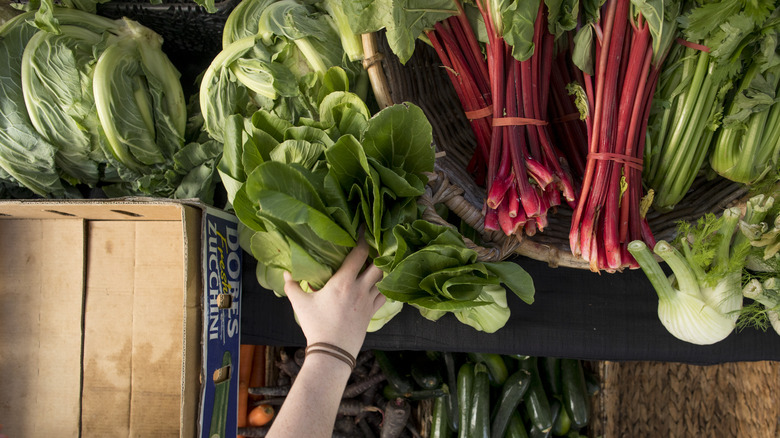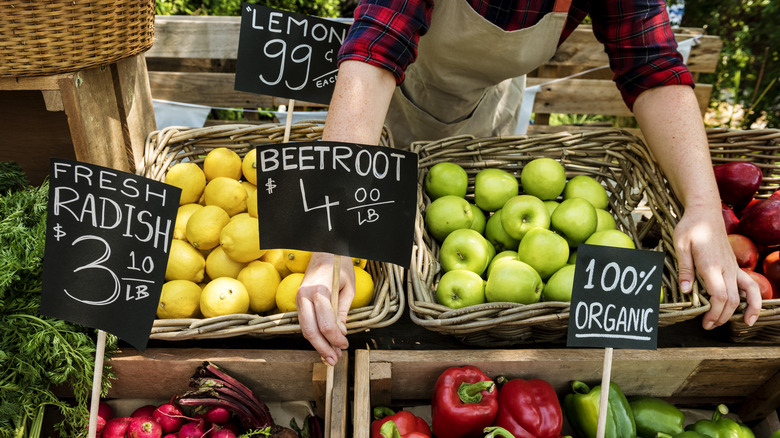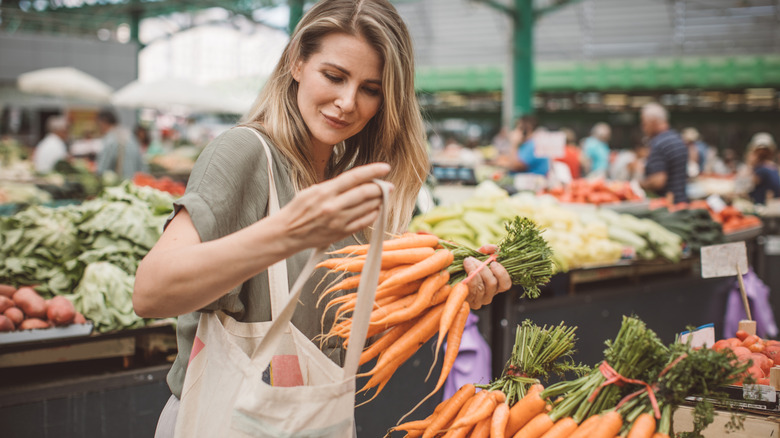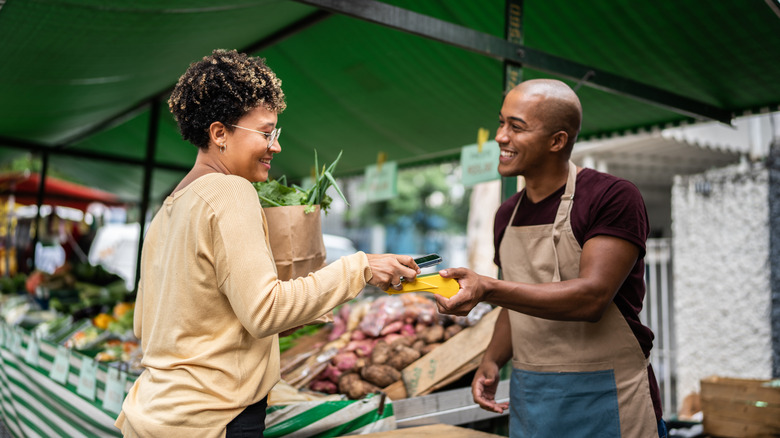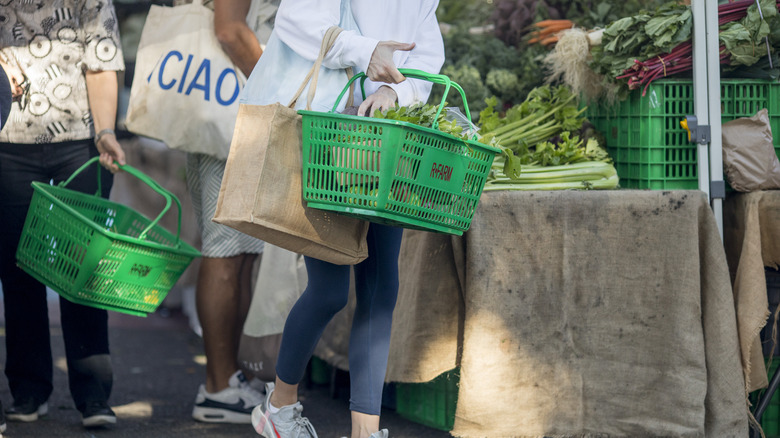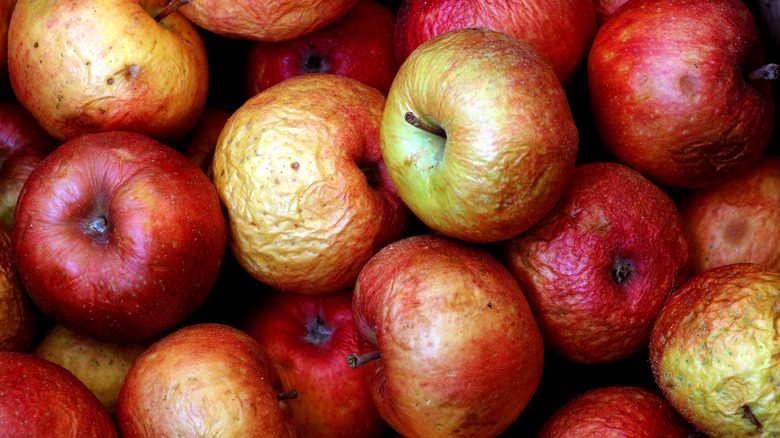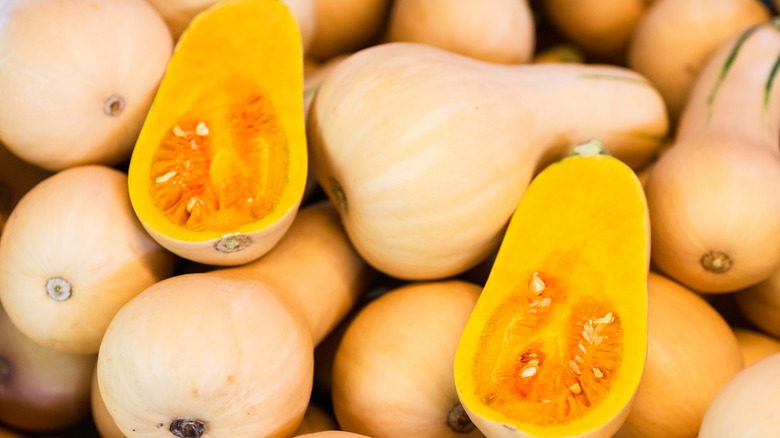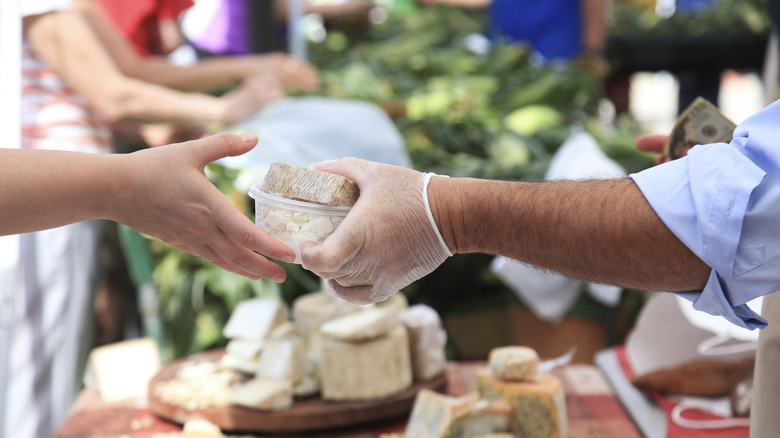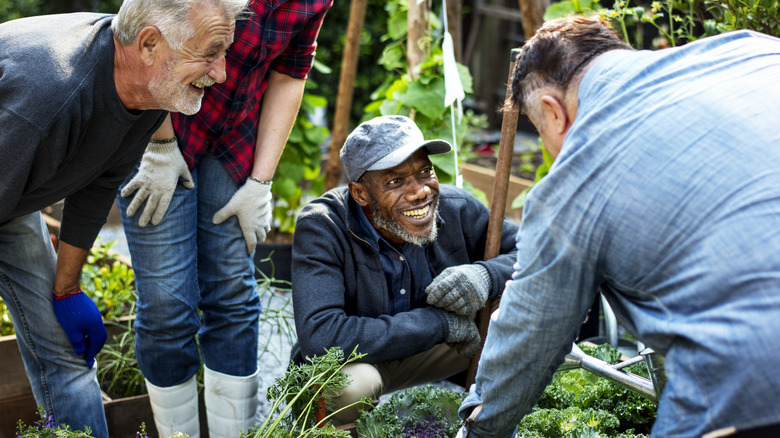15 Tips You Need When Shopping At The Farmers' Market
If you get excited when you think about spending a Saturday morning at a farmers' market, you should consider yourself a locavore (or "localvore," depending on the spelling). And even if you don't get giddy over strawberries grown in the next town over or chicken that has been raised and processed within your county, you can still appreciate the diversity and community orientation that a farmers market provides its community.
These markets offer more than just locally-grown provisions; they're also a way for vendors to interact with community members, assess market demand for certain products, and build rapport with the individuals it serves. You may also find vendors at your local market offering more than just food; several farmers' markets also provide entertainment, live music, jewelry, and art. Whether you're a pro or a first-timer, here are some of our best tips for getting the most out of your local farmers' market.
1. Start with a lap around before buying anything
You've arrived at your local farmers market, canvas bags in tow, ready to shop. Immediately, you're greeted by the smells of a local bakery vendor selling fresh ciabatta loaves while the table across the street unloads its root vegetable haul. Since there are so many sights (and smells), you are likely inclined to start buying from the first vendor that has something you want. But this strategy isn't ideal for saving money or getting the most out of your farmers' market experience.
Instead, when you first arrive at your farmers' market, take a few laps around to sort out what all the vendors have to offer. This will allow you to assess the prices and quality of goods that different vendors are selling — and you'll likely get some ideas for what you can make for dinner with your farmers' market finds. Taking a lap or two is also helpful if you arrive early in the morning, as many vendors aren't fully finished setting up as soon as they arrive on-site.
2. Research your vendors
Many farmers' markets will connect with their digital community using a Facebook page, email listserv, newsletter, or website. They'll often post about what vendors are attending the farmers' market, pertinent information about cancellations or weather-related changes, or other information that is helpful to know before you attend the market. As a consumer, this allows you to learn about what kinds of vendors you can expect to see at the market and what types of goods they will be bringing with them. From there, you can research the growing practices of the farms and connect with the vendors digitally.
If you consider yourself a serial planner, you can start writing a list of the must-visit vendors at your market; this is especially helpful if you're going to a popular venue where vendors tend to sell out early on. Shop at your priority stands first, then make your way around and check out the rest.
3. Make a list of what you need, but don't be afraid to be creative
Most people don't use farmers' markets as a primary source of groceries, so it's always wise to plan around the availability of your ingredients and the prices. Before going to your first farmers' market, we recommend making a complete list of the groceries you'll need for the week (or however long you plan to shop for). Dry goods, like flour, rice, and grains, are usually not something you'll find at a farmers' market. In comparison, bread, produce, and meats are common for many farmers' markets and grocery stores — but you're likely to get better quality (or more localized) options at the market. Decide what is worth splurging on at the farmers' market versus what you'd instead buy at the grocery store.
One of the beautiful things about farmers' markets is that you're going to get a medley of items — some of which you can't predict or plan for ahead of time. Use the shopping experience as an opportunity to try new ingredients in your everyday meals.
4. Use your senses to find the best provisions
If you're a sensory-oriented shopper, buying food from a farmers' market is an experience for you to try. You'll be greeted with the wafting smells of freshly baked bread and pastries and bouquets of cut flowers, sounds of people chatting and laughing with one another, and the overwhelming sight of a lot of vendors and foot traffic. Although it might seem a bit overstimulating, using your senses to purchase your farmers' market goods will ensure you get the best quality.
One of the best farmers' market tips is to allow your eyes to guide you to different vendors. Look for bright colors, sturdy appearances, and minimal blemishes. When you touch some foods, like heirloom tomatoes or berries, note if they squish in your hands; if they do, this may mean that these goods are not fresh. Take a good whiff of your produce and baked goods — if they smell fresh, they probably are.
5. If you're worried about prices, shop somewhere else
There's no way around it — farmers' markets can be expensive. The reasons for this are numerous but may include more expensive (but in turn, more environmentally sustainable) growing practices, the upfront cost for the vendor to attend the market, less cost-efficient methods of transportation for the food to get to the market, staffing, and premiums for practices like organic certification. The cost of these factors is translated to the consumer through the increased purchasing cost. So while you may have been spending $2.50 for a head of lettuce at your grocery store, you may be looking at upwards of $5 to $6 at a farmers' market. However, consider the amount that you're investing in your local farmer as money that is being recycled into your community rather than the value that is being placed in the hands of agri-business (which historically pays farmers very little for the food they produce).
It's a privilege to be able to afford to get your food from a farmers' market — and this issue is deep-seated in questions of equity and access. With that in mind, there has been some movement in farmers' markets offering to take Supplemental Nutrition Assistance Program (SNAP) benefits as a way to increase accessibility to farmers' markets among historically under-served populations.
6. Keep seasonality in mind
If you go to a farmers' market in North Dakota in December, there's a reason why you won't find fresh strawberries or bunches of basil. Farmers' markets allow people to shop seasonally and enjoy their local food system during the peak of the growing and harvesting season. In the early summer months (and depending on the region you're in), you can expect to see berries and herbs, while squashes and apples won't typically make their way to the farmers' market until the early fall. You should know what kind of goods you should expect to see at your market based on the seasons.
One of the ways to get the most out of seasonal veggies is to buy in bulk while things are in season and explore preservation methods to help keep the flavors going all year round. As your vendors if they have a surplus of strawberries for making jam or cucumbers for pickling. If you buy in bulk, you might also be able to get a bigger discount than procuring produce in standard sizes.
7. Bring enough cash and reusable bags
There are a few things you need to bring with you to the farmers' market to ensure you have a worthwhile experience. The first are reusable bags to place your purchases in; we recommend always bringing one extra just in case you buy more than you originally intended. If you plan on purchasing frozen foods, meats, and seafood that need to stay cold, pack accordingly with a cooler or insulated bag. You may also want to bring some plastic bags to prevent juices from the meat from dripping out onto your other purchases.
The other important thing to pack when you go to a farmers' market is cash. Although we live in the 21st century and can't live without a credit or debit card, some smaller vendors will appreciate small bills — and not having to pay the credit card surcharge that comes with a purchase.
8. Ask your vendors questions
We recommend using the farmers' market as an opportunity to interact with your local farmers and vendors. With a grocery store, you don't always have the option to ask if your meats were humanely slaughtered or if your produce was grown with exposure to certain herbicides. Now, you have an opportunity to truly get to know your food from someone knowledgeable and close to the growing process every step of the way.
Asking your vendor questions is an easy way to dispel rumors about how your food was produced. One of the most common misconceptions about the food available at farmers' markets is that it's all organically grown, made with sustainable methods, and the like. In reality, it may not be any more sustainable than what's available at your grocery store — the only benefit may be that it's local. Asking questions about growing practices will help make you a more educated and empowered consumer.
9. Time out when you go to the market
Markets can last anywhere from several hours to a whole day. Therefore, you must be strategic in choosing when to go to the market to get the best deals. If you're aiming for a produce-heavy trip where you're looking for the peak of freshness, you're better off going to the market in the morning. Bread and baked goods tend to go stale after a few hours in the sun, so it's always better to shop for these early as well. The downside: you'll likely have to contend with more foot traffic.
If you're buying in bulk and aren't too set on getting the absolute freshest food, we recommend going closer to closing time. Then, depending on the market policy, you can inquire and bargain with vendors for the leftover goods they have before they pack up and bring everything back with them.
10. Don't be restricted to just produce and meats
Farmers' markets offer more than just food. Many offer small art enclaves where local artisans can bring their jewelry, paintings, apparel, and alike to sell to visitors. Flowers and plants are also commonly for sale. Early on in the summer season, you may find several purveyors offering seedlings and starter plants at significantly lower prices than greenhouses or garden stores. You're also likely to see less popular or heirloom varieties of plants at your farmers' market — which is perfect for folks looking to start a diverse summer garden.
Since farmers' markets can be so varied in their offerings, we recommend reserving some of your market funds for purchases that catch your eye. Take advantage of all that your local farmers' market has to offer and build those connections with your community vendors. You might just find a new favorite spot!
11. Inquire about seconds
Vendors typically bring their most attractive produce to a farmers' market because it offers the most curb appeal. But you can settle for seconds if you plan to make jams, pickles, or pies from your produce. Seconds are produce with some blemishes, whether a couple of scrapes, odd shapes, or bruising, that prevent them from being sold at market price. While these aren't the prettiest pieces of produce, they are still safe to eat and serve their utility.
When you shop from a farm, try to ask about their seconds. While they might not have them available for sale at the market, they may be able to put you in touch with someone who can offer you seconds at a different price. Some farms also offer community gleaning days, during which the public can go to a farm and pick up the leftover produce from the fields that were otherwise left by the few rounds of harvesting.
12. Shop for whole produce for maximum longevity
If you don't have the opportunity to shop at a farmers' market regularly, you should try to buy foods with the longest shelf life possible to enjoy them long after you've left the market. The types of produce that last the longest in the fridge include apples, cabbage, root vegetables, and cauliflower. Best practices for storing these foods include keeping them away from dramatic changes in moisture and temperature, but you can also take some steps when you're at the market to keep your food fresh.
Some vendors will trim the tops of their vegetables to make them more appealing to buyers. But if you're planning on enjoying your produce right away, aim for whole vegetables with the least amount of cutting; they tend to stay the freshest in the refrigerator. Plus, you can use your leftover stems and stalks to make dishes like carrot top pesto or DIY vegetable stock.
13. Know the signs of an unscrupulous vendor
A well-run farmers' market will do as much as possible to keep their market representative of local community farms and other vendors. But, there might be a couple of stands you may want to avoid. For example, if you see a vendor selling produce that is clearly out-of-season or isn't local, it may indicate that the vendor is just a box retailer trying to unload their food on unsuspecting customers. In these cases, you may be paying a premium for the same items that would be available at your local chain grocery store.
Another tip for deciding which vendors are less than legitimate is to inquire about how the food is grown, where the farm is located, and other specifics that a grower should be able to answer. If you're getting vague answers (or none at all), it's time to find another vendor.
14. Eat before you go (or purposely avoid it)
Farmers' markets don't only offer items that you have to craft into a dish yourself when you get home. Many markets feature food trucks or stands selling an assortment of prepared foods from local businesses. For example, if you're stopping at the Burlington Farmers Market in Vermont, you'll find a variety of dumplings from Green Mountain Potstickers, sweet maple lemonade from Theo's, and popsicles from Curly Girl Pops.
Is it good farmers' market etiquette to come in with food purchased before you come to the market? While we don't have an exact answer, we should note that some markets may have rules about bringing outside food and beverages into a space. If you know that you tend to over-shop when your stomach starts to grumble, we recommend grabbing a bite to eat before visiting your farmers' market — and saving a few bucks for if you get hungry again.
15. Use the market as a chance to get involved more in your local food system
It's important to note that farmers' markets are not the only way you can build connections to your local food system. Instead, use your visit as a jumping-off point for interacting with local farmers and businesses. Outside of your farmers' market, you can join a community-supported agriculture (CSA) program that allows you to pay in at the beginning of the season and receive goods from the farm throughout the growing year. The initial investment in the program helps farmers pay initial operating costs while consumers get to enjoy a medley of different fruits and veggies.
If you want to get involved with the organizational structure of the farmers' market as well, you can check out volunteer opportunities. While you might just be directing traffic or handing out flyers, you can rest assured knowing that you made a difference in helping more people access local foods.
